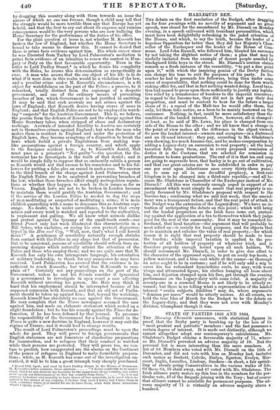HARLEQUIN BEN.
Tnn debate on the first resolution of the Budget, after dragging on for four evenings with no novelty of argument and no great speech, was closed for the amendment by Mr. Disraeli on Monday evening, in a speech enlivened with trenchant personalities, which must have been delightfully refreshing to the jaded attention of the House, and which, to say the truth, became the leader of a hopeless Opposition far better than they did her Majesty's Chan.. cellor of the Exchequer and the leader of the House of Com- mons. Lord John Russell, who followed him, blunted his sarcasms by not taking the slightest notice of them ; a plan that may be usefully imitated from the example of decent people assailed by blackguard little boys in the street. Mr. Disraeli's oration claims remark as a fresh instance of the versatility, "to put a fine point upon it," with which the inspiring genius of the Derby faction can change his tone to suit the purposes of his party. In De- cember he had to persuade his followers, being then under some sense of responsibility, that nothing could be done for them worth risking office for, and that in fact nothing wanted doing. Local taxa- tion had ceased to press upon them sufficiently to justify any legisla- tive relief by a transference of burdens to the imperial resources ; in regard to the Income-tax, they did not in fact pay their due proportion, and must be content to bear for the future a larger share of it ; a repeal of the Malt-tax he would offer them, but only, let them take notice, as a boon to be mainly bestowed on the consumer. Nothing, in fact, could be more satisfactory than the condition of the landed interest. Now, however, all is changed: at least, as he said of Mr. Lowe, his place is changed from one side of the House to the other ; and we all know that a change in the point of view makes all the difference in the object viewed. So now the landed interest—owners and occupiers—is a distressed and an ill-used interest : they pay, according to Mr. Gladstone's own showing, too much Income-tax, and he makes compensation by adding a Legacy-duty on succession to real property ; all the local taxation falls upon them, and in every proposed remission of duties it is the Customs that are selected for remission in preference to home productions. The end of it is that tea and soap are going to supersede beer, that barley is to go out of cultivation, and that our great estates are to be subdivided in order to pay one per cent upon inheritance once every thirty-three years; or, to sum up all in one dreadful prophecy, a first-rate kingdom is to be changed into a third-rate republic,—and all be- cause Mr. Gladstone is Chancellor of the Excheqner instead of Mr. Disraeli ! All this was curiously enough urged in support of an amendment which went simply to assert that real property is un- justly favoured by Mr. Gladstone's proposal with respect to the Income-tax; confirming what we said last week, that the amend- ment was a transparent fiction, and that the real point of attack in the Budget was the extension of the Legaeytduty. We have no in- tention of anticipating the debate on this point ; which will bring out. the landed proprietors as the Irish have come out, protest- ing against the application of a tax to themselves which they judge good for the rest of the community. But it may be remarked be- forehand, that local taxation—the argument that will probably be most relied on—is mainly for local purposes, and for objects that go to maintain and enhance the value of real property,—for which reason it is right that real property should be made to bear the burden ; while imperial taxation is applied to the pro- tection of all holders of property of whatever kind, and is therefore properly enough levied upon all such holders. We should recommend Mr. Disraeli, in order to give due effect to the character of the oppressed squire, to put on seedy top-boots, a yellow waistcoat, and a blue coat white at the seams—so thorough an actor ought to be in costume ; and if he will only add a wig to cover his too redundant hyacinthine curls, he may, with worn visage and attenuated figure, his clothes hanging all loose about him, and dejection stamped upon his face, get through the evening performance on the Legacv-duty with some éclat. A majority of seventy-one in a crowded' House is not likely to be utterly re- versed; but there is no telling what a representation of the landed interest " oculis subjects fidelibus " may do, where arguments " demissa per auras" would be utterly useless. At all events, we hold the true Ides of March for the Budget to be the debate on the Legacy-duty, and that they were not over with Monday's division, triumphant though it was.


























 Previous page
Previous page